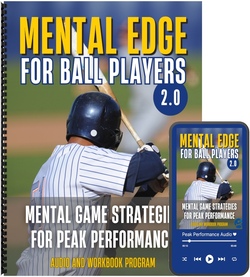
How to Remember the Past and Excel in Baseball
“What is the difference between remembering the past and reliving the past?”
One athlete recently asked this question about what to focus on:
“I’ve been told to focus on the present moment if I want to play to the best of my abilities. Sometimes, before a game, I get nervous about playing a rival team. I’m not sure I’m up to the task even though I’ve had some of my best games against this team.”
He went on to say: “I’ve been told to recall these past games to build my confidence. But when I’m on the mound, after I’ve given up a few runs, my coach tells me to focus on the present and stop thinking about the past. This really confuses me about what I am exactly supposed to focus on, remembering past games or playing in the present.”
This is a valid question. Memories have a strong impact on the present and can stir intense emotions, both positive and negative. Depending upon what you recall from the past will directly influence how you perform in the present.
Here’s the difference between remembering the past and reliving the past. Remembering thinking about a successful play usually refers to recalling successful events.
Reliving the past has a negative connotation and usually refers to being stuck on a past mistake.
Remembering successes in the past can be boost confidence that you can succeed again and battle through current rough patches.
Remembering successful events boosts your confidence, minimizes anxiety and helps you focus by eliminating negative distractions.
On the flip side, reliving the past errors clutters your mind with negativity, generates intense negative emotions and blocks you from focusing in the moment.
Reliving the past chips away at your confidence as you try to avoid the past repeating itself.
The potential positive or negative impact of the past is what every baseball player needs to navigate through.
Take for example, Philadelphia Phillies’ pitcher David Robertson…
Robertson is a 12-year veteran with a proven track record as a reliever.
Due to his dependability, the Phillies signed Robertson to a $23 million, two-year free agent contract. Unfortunately, in his first five appearances in 2019, Robertson has under-performed with a 9.82 ERA.
Robertson has been frustrated to the start of his 2019 season.
ROBERTSON: “I’ve been [stinking] out there, that’s for sure. I throw it over the plate, it gets hit. Not throwing strikes, walking guys, putting guys on, giving them every chance to score runs. It’s probably three of the worst outings I’ve ever put together. Fortunately, we won the last two games but I’m pretty hard on myself and if I keep going out there and pitching like crap, I’ll have to figure something out.”
The question remains will Robertson get caught up mentally replaying his slow start or will Robertson remember the past successes he has had in the past, such as his 2.54 ERA, 0.94 WHIP and 189 strikeouts in 138 innings over the last two seasons?
If he can do the latter, he will not only feel confident but, most likely, regain his form.
Using “The Past” to Boost Confidence:
When thinking about past performances, think about the plays that made you feel successful.
When is the last outing that you felt in control, focused, and winning the small battles?
Recall these moments of success and imagine yourself performing the same way in today’s game.
I know for sure that this approach has to be way better than thinking about avoiding errors, giving up walks, and striking out–the same ones you made in the past!
Related Sports Psychology Articles
*Subscribe to The Sports Psychology Podcast on iTunes
*Subscribe to The Sports Psychology Podcast on Spotify
Get The Mental Edge for Baseball and Softball
If you have trouble taking your practice game to competition and under perform in games, your mental game might be the culprit! Baseball and softball players contact me everyday wanting to know why they become scared, anxious, afraid to make mistakes, and lack trust in their skills during games…
You might have a ton of physical talent and perform great in practice, but if you can’t get the job done when it counts, something is missing and the problem is an inferior mental game–not talent or motivation.
We’ve spent the last six months developing a program to teach you how to improve your mental game in 8 easy-to-apply lessons–the same TOP lessons that I teach to baseball and softball players everyday in my one-on-one mental coaching program!

